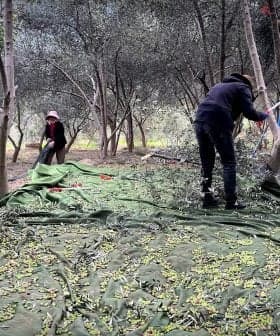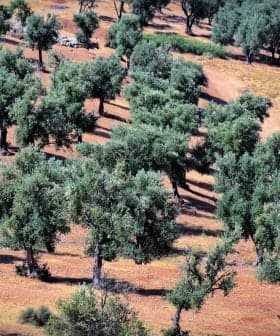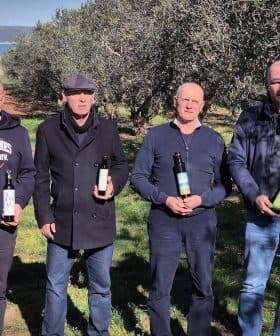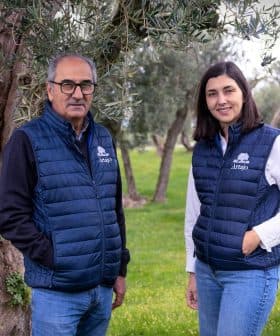60 Years in, Olive Council Looks at Challenges Ahead
As part of the celebration of the 60th anniversary of the IOC, Executive Director Abdellatif Ghedira spoke exclusively with Olive Oil Times on the challenges facing the sector.
The International Olive Council celebrated its sixtieth anniversary in Rome, with top officials discussing emerging perspectives and challenges, including climate change impacting olive oil production. The IOC, composed of 17 member nations and the EU, aims to promote sustainability, quality, and cooperation among olive oil-producing countries to create a circular and green economy.
The International Olive Council (IOC) celebrated its sixtieth anniversary on a visit to Rome, where some of its top officials gathered to discuss the emerging perspectives and challenges facing the intergovernmental organization.
The IOC was established in 1959 under the auspices of the United Nations and is currently composed of 17 member nations as well as the European Union.
I insist that the most important thing is the quality of olive oil.
Abdellatif Ghedira, the executive director of the IOC, told Olive Oil Times about the IOC’s long-term vision of sustainability and touched upon some of the olive-growing world’s biggest challenges, including climate change.
Ghedira acknowledged that, over the last decade, producer countries have suffered difficult seasons characterized by extreme weather conditions.
See Also:IOC NewsIn an Olive Oil Times survey, growers from around the world said irregular weather patterns caused them trouble during this year’s harvest.
“Climate change is already having an impact on world production, leading to major fluctuations which play a big factor on the price of oil,” Ghedira said. “As I have said on several occasions, you begin to see the effects on the olive tree, a plant that is normally very resistant.”
However, Ghedira also touted the olive tree as a plant that may help mitigate some of the effects of climate change, including sequestering carbon dioxide as well as preventing erosion and desertification.
“We have calculated that producing one kilogram (2.2 pounds) of olive oil absorbs the equivalent amount of carbon dioxide emissions of a car consuming 10 liters (2.6 gallons) of fuel,” he said. “This means that every olive tree helps limit the negative effects of climate change, by absorbing more atmospheric carbon dioxide than it produces.”
Through large-scale cooperation, Ghedira and Jaime Lillo, the deputy director of the IOC, see olive cultivation and oil production not only as an environmentally sustainable industry, but one that can be economically and socially sustainable as well.
“The olive tree is a sustainable crop, which has a dimension of social sustainability, and forms the basis of the economy of several countries,” Lillo told Olive Oil Times. “We are also working on how to use the byproducts generated by the olive oil extraction, and therefore we promote the use of resources and the creation of constructive relationships, toward a circular and green economy.”
In order to create a sustainable circular economy, the IOC needs buy in from all major olive growing and oil producing nations, Ghedira said. It is this need for global cooperation, which is why the organization is open to re-admitting pariah states, such as Syria.
“The IOC is a technical organization, with no political overtones,” Ghedira said. “We think that all countries that produce and consume olive oil should be members of our organization. We need them and their farmers, just like they need us, because we can benefit from each other’s knowledge and hold an exchange of views.”
“Syria should apply, as it is an important producer which previously produced six percent of world output,” he added. “They asked to join us, and, as we said in Argentina, they are welcome. Yet, since they have left the IOC and have a financial debt to the organization, we are discussing how they can pay it, in order to present their dossier to the IOC.”
Ghedira also welcomed the increased involvement of traditionally less active IOC members, such as Libya.
“Libya is a founding member of the IOC, and one of the first countries to believe in this organization,” he said. “Economic development is essential for it in order to reach economic and, therefore, overall stability. For Libya, the olive sector could be an important part of this beneficial process.”
Ghedira also pointed out that olives and olive oil have deep cultural roots in the North African nation and this cultural heritage combined with improved olive oil production and analysis techniques could help boost the country’s international olive oil profile.
“As Libya asked us to become an active member, we sent experts on the ground, who explained that the key to the development of the olive oil sector is the creation of laboratories to analyze the quality of oils,” he said.
“They have agreed and are working on this in order to improve the quality of their production,” Ghedira added. “I am glad about that, because I think that producing table olives and olive oil is not only a matter of economic power but also a matter of love, knowledge and field work.”
Ghedira went on to commend the growing number of countries that are expressing interest in olive oil and table olive production. He said that it is encouraging to see countries, such as Namibia, China, Japan, Palestine, New Zealand and Saudi Arabia express interest in joining the IOC.
He specifically praised Iran, Georgia and Albania, all of which are in the process of accession to the intergovernmental organization.
“We are glad that these countries want to join us, as they also believe in the sense of togetherness of olive oil, when it comes to talk about quality and find solutions to problems,” Ghedira said. “Considering that 95 percent of the world production is made by our members, and 75 percent of consumers come from our member countries, we can say that the IOC truly represents the world olive oil.”
However, celebrating the IOC’s sixtieth anniversary was not just a moment to look back at how far the organization has come, but to also look ahead at the challenges it, and global olive oil producers, are facing.
“Olive oil represents barely three percent of the fat consumed in the world, it is a little gem,” Ghedira said. “For this reason all those who make it without paying attention to quality hurt the industry, all those who fail to make a good olive oil damage the sector.”
“Now, our role is to encourage the creation of laboratories to adapt to international standards and increase quality, and we are glad to see that all the countries are working on that, by setting up more labs aimed at quality,” he added.
Improving quality was a consistent theme throughout Ghedira’s conversation with Olive Oil Times. For him, this emphasis on quality is not only practical, but also hits close to home and his own experiences with olive oil.
“I was born a farmer, and I would like to share with you something that you well know: the pleasure of seeing a farmer who lets you taste his olive oil and eagerly waits for you to tell him what you think, because that is the result of very hard work,” he said. “The important thing is the love for the product.”
“I insist that we should not confuse olive oil with the other oils: those who consume quality olive oil or encourage the consumption of quality olive oil help the Earth fight the climate change,” he added. “And I insist that the most important thing is the quality of olive oil.”
Lillo, the deputy director, widely agreed with Ghedira. He believes that the IOC up until this point has been successful in fulfilling all of these roles within the international olive oil community. He said that the best way for the IOC to look ahead to the next 60 years is to continue with this work.
“We spread the best practices to help farmers to have the best olive oils, improving the sustainability of production, and we think this is the only and best way to look to the future,” he said.









